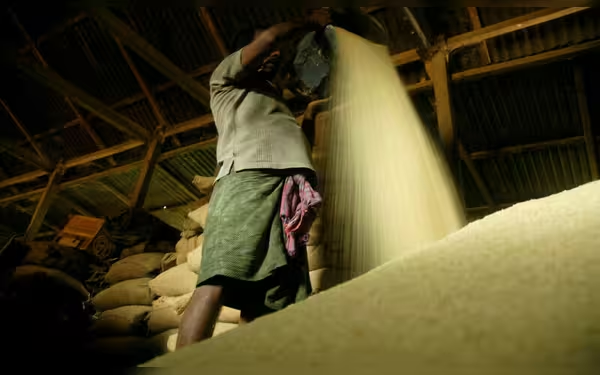Saturday, November 16, 2024 10:46 PM
India Eliminates Floor Price for Basmati Rice Exports to Boost Global Market Share
- India removes minimum export price for basmati rice.
- Farmers face debts; government responds with export policy change.
- Basmati rice exports expected to increase significantly.
 Image Credits: dawn
Image Credits: dawnIndia removes the floor price for basmati rice exports, aiming to enhance global market share and support struggling farmers.
In a significant move aimed at revitalizing its basmati rice export sector, India has officially removed the floor price for these exports. This decision, announced through a government order on Friday, comes at a crucial time as farmers face mounting debts and rising costs. The change is expected to enhance overseas sales of this premium grade rice, especially with the new-season crop set to arrive shortly.
Last year, the Indian government had established a minimum export price (MEP) of $1,200 per metric ton for basmati rice, which was later reduced to $950 per ton. As the supply of basmati rice increased, exporters urged the government to either lower or eliminate the MEP to prevent farmers from accumulating large stocks when the new crop is harvested in about a month. This proactive approach reflects the government's responsiveness to the needs of its agricultural sector.
According to Satish Goel, the president of the All-India Rice Exporters’ Association, the removal of the MEP will significantly boost India's ability to export basmati rice in larger quantities. He stated, "The decision to do away with the MEP will help India export basmati rice in large quantities, and that is going to ensure good returns to our farmers." This sentiment resonates with many farmers who have been grappling with declining incomes and soaring costs of fuel and fertilizers.
It is important to note that both India and Pakistan are the sole producers of basmati rice, and both countries strive to market this premium variety similarly to how French Champagne or Darjeeling tea is promoted. Interestingly, basmati rice is not widely consumed within India itself, and the government does not purchase this variety to build state reserves, unlike more common grades of rice.
Goel highlighted India's rich biodiversity in basmati rice, suggesting that there is a substantial overseas market for basmati varieties priced around $700 per ton. He emphasized that removing the MEP was a logical step to regain India's share in the global market. "Because of today’s decision, we will be able to regain our share in the global market," he remarked.
India currently exports between 4 million to 5 million metric tons of basmati rice, renowned for its distinctive aroma, to various countries including Iran, Iraq, Yemen, Saudi Arabia, the United Arab Emirates, and the United States. However, the Indian government has faced criticism from farmers due to a series of export restrictions on agricultural goods imposed by Prime Minister Narendra Modi’s administration. Following losses in rural constituencies during this year’s general election, the government is eager to appease farmers ahead of upcoming state assembly elections in Haryana and Maharashtra.
The removal of the floor price for basmati rice exports is a strategic decision that not only aims to support farmers but also seeks to enhance India's competitiveness in the global market. As the agricultural landscape continues to evolve, it remains crucial for the government to balance the needs of farmers with the demands of international trade. This development could potentially lead to a more stable income for farmers and a stronger position for India in the global rice market.













